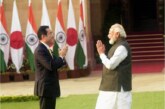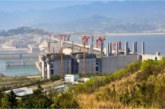Report on Workshop on Water Resources Management in North-East India
By Dr Arvind Kumar
 A two-day Training Workshop on Water Resources Management in North East Region with special Rference to Floods was held on 4-5 April 2011 at Shillong (Meghalaya). This workshop was jointly hosted by National Institute of Hydrology under the Union Ministry of Water resources and Government of Meghalaya. The workshop was addressed by Union Minster of Water Resources, Salman Khursheed, Union Minister of State for Water Resources, Vincent Pala, and Chief Minister of Meghalaya, Dr. Mukul Sangma. Others present on the occasion also included: F. W. Momin, Minister for Community and Rural Development, Government of Meghalaya and W.M. S. Pariat, Chief Secretary to the Government of Meghalay. Many technical experts from different institutions presented their papers in the workshop.
A two-day Training Workshop on Water Resources Management in North East Region with special Rference to Floods was held on 4-5 April 2011 at Shillong (Meghalaya). This workshop was jointly hosted by National Institute of Hydrology under the Union Ministry of Water resources and Government of Meghalaya. The workshop was addressed by Union Minster of Water Resources, Salman Khursheed, Union Minister of State for Water Resources, Vincent Pala, and Chief Minister of Meghalaya, Dr. Mukul Sangma. Others present on the occasion also included: F. W. Momin, Minister for Community and Rural Development, Government of Meghalaya and W.M. S. Pariat, Chief Secretary to the Government of Meghalay. Many technical experts from different institutions presented their papers in the workshop.
In his inaugural address to the workshop, Union Minister of Water Resources, Salman Khursheed, while expressing concern at the reports about the pollution of many rivers and other water resources in Meghalaya, lamented that pollution of water resources would have adverse impact on the health of the native population. While assuring the State Government of his Ministry’s support in restoring the various water bodies, including the Umiam Lake, the Union Minister also assured his support for the Integrated River Basin Development and Livelihood Programme recently launched by the Government of Meghalaya.
Calling on the people not to be unnecessarily worried about the Chinese plan to dam the Brahmputra River, the Union Minister said: “I am aware that there has been some concern on the activities of the Chinese in the Brahmputra River, but as per the assessments made there is reason to panic.” He also informed that China had assured India that it would not disturb the flow of the Brahmputra. He also emphasized on the need for having a national movement on water management apart from involving the local people in rejuvenating the water bodies.
In his address to the Workshop, Union Minister of State for Water Resources, Vincent Pala, while welcoming the tremendous development of water resources in the country in areas of irrigation, hydropower generation and food production, lamented that the scenario was far from satisfactory in India’s North-East region, which accounts for more than one-third of the country’s water resources. Describing the Brahmputra Valley as much greater flood-prone than any other flood-prone valleys in India owing to its physiography, distribution of rainfall and basin geology, Mr Pala that the flood protection measures adopted, thus far, are yet to be extended to many of the critically flood prone areas.
Mr. Pala suggested a number of remedial measures for tackling the water resources issues in Meghalaya, which inter alia included: launching a Meghalaya Water Mission, Preparation of basin-wise Irrigation Master Plan, and ensuring integrated Water Resources development, strengthening water quality monitoring system, promoting water harvesting activities and rejuvenation of springs, promoting civil society organizations, legislation for participatory irrigation management and groundwater regulation with launching massive mass awareness programmes in Maghalaya.
In his address to the Workshop, Dr Mukul Sangma, Chief Minister of Meghalaya, said that his Government was working on evolving a comprehensive Water Policy besides bringing in a comprehensive Water legislation to address issues relating to groundwater management and regulation, water use efficiency and participatory management. Dr Sangma also suggested for establishing State units of the Brahmputra Board in all states of the region to make the organization more effective.
In his welcome address to the Workshop, Dr. R.D. Singh, Director, National Institue of Hydrology (Roorkee), while mentioning about the salient objectives of the NIH, informed that NIH Centre for Flood Management Studies for the Brahmputra Basin, formally launched in September 2001, is now working in areas like: flood estimation and routing, structural/non-structural measures for flood management, integrated watershed management for flood control, drainage congestion and erosion problems and conducting water quality studies and technology transfer activities. He further informed the audience that the objective of the two-day training workshop was to train the prsonnel in water resources development and management in North-East Region by providing state-of-the-art knowledge and technology in managing floods.
Dr Arvind Kumar, President of India Water Foundation, a New Delhi-based non-profit civil society, in his paper entitled “Water Resources Management in North East Region with special Reference to Floods: A Civil Society Perspective”, presented at the Workshop, lamented that factors like growth in population, increased food production, expansion of economic activity and societies becoming more affluent have proved instrumental in burgeoning demand for water. The ongoing process of climate change has seemingly added more pressure on finite water resources. In some instances, demand outstrips supply. While dealing with flood management strategies he stressed on the need for adopting measures like: continuous consultations with stakeholders, switching over to land-use adaptaion mechanism, keeping climate change factor in view while formulating water policy, encourage research and monitoring activities, utilizing satellite image-based morpholigical studies, establishing minimum flood prtection levels, ascertaining hydraulic impact of embankments, ascertaining the feasibility of proposed storage dams, and taking suitable measures for ensuring erosion control.
While deaing with the role of the civil society like India Water Foundation in water resources management and flood control in North East Region, Dr Kumar stated that water resource management with specific reference to floods in North-East India was a complex problem which required holistic approach. Pointing to the frequency of floods being a recurring phenomenon in North-East region, Dr Kumar said that the engineering and technological solutions are significant as well as the importance of social engineering in mobilizing the support of the people and role of the civil society is equally worthwhile. The civil society can quite strongly affect the bonding between the people and the official bodies dealing with implementation of measyres designed to control floods. The people are positively responding to the civil society activities. Undeniably, the civil society has emerged as a potent instrument of building capacity among participants, creating new arenas and considering local context. Civil society has also echoed the voice of marginalized groups. He emphasized that in view of the mounting problems in managing water recources as well as floods in the North-East, increased role of civil society is required to be encouraged.


